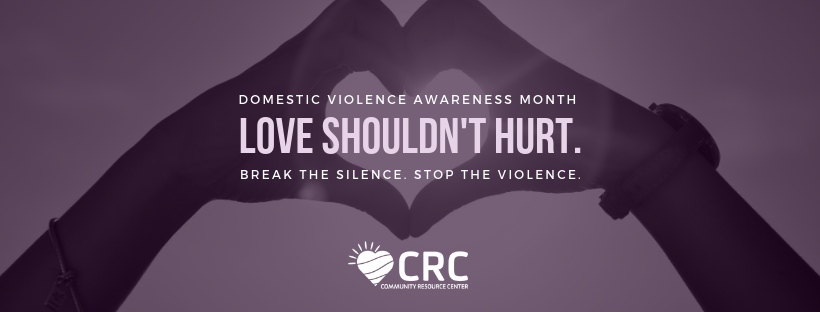
October is National Domestic Violence Awareness Month
If you need help: Call Community Resource Center’s 24/7 Domestic Violence Hotline: 1-877-633-1112. If you are in danger, call 911.
Every 9 seconds, a woman is assaulted or beaten in the United States. 1 in 4 women and 1 in 7 men have been victims of severe physical violence by an intimate partner in their lifetime. (National Coalition Against Domestic Violence)
Take a stand today to help end the violence.
How You Can Help
- Awareness: Nearly 3 in 4 Americans personally know someone who is or has been a victim of domestic violence. Learn more about domestic violence and the warning signs so that you can be better equipped to help break the silence. Learn more in our resources below.
- Advocacy: Vote YES on Prop 1, the Veterans and Affordable Housing Act, which would build affordable homes across California. This is incredibly important, because new data from UCLA shows that nearly a quarter of Californians experiencing homelessness are victims of domestic violence.
- Action: Take the pledge to support survivors and intervene in situations in which sexual assault or abuse may occur.
Get inspired: Join CRC at Exposure Skate on November 3 and 4, a women’s skateboarding competition focused on raising awareness of domestic violence. Event proceeds benefit CRC’s domestic violence shelter and programs. Learn more
What is Domestic Violence?
Domestic violence is a pattern of behaviors used by one partner to maintain power and control over another partner in an intimate relationship.
Domestic violence does not discriminate. Anyone of any race, age, sexual orientation, religion or gender can be a victim – or perpetrator – of domestic violence. It can happen to people who are married, living together or who are dating. It affects people of all socioeconomic backgrounds and education levels.
Domestic violence includes behaviors that physically harm, arouse fear, prevent a partner from doing what they wish or force them to behave in ways they do not want. It includes the use of physical and sexual violence, threats and intimidation, emotional abuse and economic deprivation. Many of these different forms of domestic violence/abuse can be occurring at any one time within the same intimate relationship.
(The National Domestic Violence Hotline)
What are the Warning Signs of Domestic Violence?
When one person scares, hurts or continually puts down the other person, it is abuse. Domestic violence doesn’t look the same in every relationship because every relationship is different. But one thing most abusive relationships have in common is that the abusive partner does many different kinds of things to have more power and control over their partner.
Some of the signs of an abusive relationship include a partner who:
- Tells you that you can never do anything right
- Shows extreme jealousy of your friends and time spent away
- Keeps you or discourages you from seeing friends or family members
- Insults, demeans or shames you with put-downs
- Controls every penny spent in the household
- Takes your money or refuses to give you money for necessary expenses
- Looks at you or acts in ways that scare you
- Controls who you see, where you go, or what you do
- Prevents you from making your own decisions
- Tells you that you are a bad parent or threatens to harm or take away your children
- Prevents you from working or attending school
- Destroys your property or threatens to hurt or kill your pets
- Intimidates you with guns, knives or other weapons
- Pressures you to have sex when you don’t want to or do things sexually you’re not comfortable with
- Pressures you to use drugs or alcohol
(The National Domestic Violence Hotline)
More Resources:
Do You Think You’re Being Abused? Warning signs and red flags from the National Coalition Against Domestic Violence
Warning Signs of Dating Abuse from Love is Respect
Why Do People Stay in Abusive Relationships?
Leaving is often the most dangerous time for a victim of abuse, because abuse is about power and control. When a victim leaves, they are taking control and threatening the abusive partner’s power, which could cause the abusive partner to retaliate in very destructive ways.
Aside from this danger, there are many reasons why people stay in abusive relationships. Here are just a few of the common ones:
- Fear: A person may be afraid of what will happen if they decide to leave the relationship.
- Believing Abuse is Normal: A person may not know what a healthy relationship looks like, perhaps from growing up in an environment where abuse was common, and they may not recognize that their relationship is unhealthy.
- Fear of Being Outed: If someone is in an LGBTQ relationship and has not yet come out to everyone, their partner may threaten to reveal this secret.
- Embarrassment or Shame: It’s often difficult for someone to admit that they’ve been abused. They may feel they’ve done something wrong by becoming involved with an abusive partner. They may also worry that their friends and family will judge them.
- Low Self-Esteem: When an abusive partner constantly puts someone down and blames them for the abuse, it can be easy for the victim to believe those statements and think that the abuse is their fault.
- Love: So often, the victim feels love for their abusive partner. They may have children with them and want to maintain their family. Abusive people can often be charming, especially at the beginning of a relationship, and the victim may hope that their partner will go back to being that person. They may only want the violence to stop, not for the relationship to end entirely.
- Cultural/Religious Reasons: Traditional gender roles supported by someone’s culture or religion may influence them to stay rather than end the relationship for fear of bringing shame upon their family.
- Language Barriers/Immigration Status: If a person is undocumented, they may fear that reporting the abuse will affect their immigration status. Also, if their first language isn’t English, it can be difficult to express the depth of their situation to others.
- Lack of Money/Resources: Financial abuse is common, and a victim may be financially dependent on their abusive partner. Without money, access to resources or even a place to go, it can seem impossible for them to leave the relationship. This feeling of helplessness can be especially strong if the person lives with their abusive partner.
- Disability: When someone is physically dependent on their abusive partner, they can feel that their well-being is connected to the relationship. This dependency could heavily influence their decision to stay in an abusive relationship.
(Source: The National Domestic Violence Hotline)
More Resources:
Why Do Victims Stay from the National Coalition Against Domestic Violence
Why Do People Stay in Abusive Relationships from Love is Respect
What Can I Do to Help?
Break the Silence
Help for Friends and Family
- Don’t be afraid to reach out to a friend who you think needs help. Tell them you’re concerned for their safety and want to help.
- Be supportive and listen patiently. Acknowledge their feelings and be respectful of their decisions.
- Help your friend recognize that the abuse is not “normal” and is NOT their fault. Everyone deserves a healthy, non-violent relationship.
- Focus on your friend or family member, not the abusive partner. Even if your loved one stays with their partner, it’s important they still feel comfortable talking to you about it.
- Connect your friend to resources in their community that can give them information and guidance. Remember, www.loveisrespect.org can help.
- Help them develop a safety plan.
- If they break up with the abusive partner, continue to be supportive after the relationship is over.
- Even when you feel like there’s nothing you can do, don’t forget that by being supportive and caring, you’re already doing a lot.
- Don’t contact their abuser or publicly post negative things about them online. It’ll only worsen the situation for your friend.
(Source: Love is Respect)
If you or someone you know needs help: Call Community Resource Center’s 24/7 Domestic Violence Hotline: 1-877-633-1112. If you are in danger, call 911.
Make a Donation
Give today to help families and individuals in crisis receive shelter, counseling, child therapy, legal assistance and resources to break the cycle of violence.
Learn more about our Domestic Violence Program and resources
[helpme_button style=”three-dimension” size=”large” bg_color=”#00A8A1″ txt_color=”#fff” outline_skin=”#444444″ outline_hover_skin=”#fff” icon=”theme-icon-video” url=”https://crcncc.org/domestic-violence-program/” target=”_blank” align=”left” id=”Button ID” margin_bottom=”15″]Learn more about our Domestic Violence Program[/helpme_button]
